Mannheim Steamroller is an American neoclassical new-age music group founded by percussionist/composer Chip Davis that is known primarily for its Fresh Aire series of albums, which blend classical music with elements of new age and rock, and for its modern recordings of Christmas music. The group has sold 28 million albums in the U.S. alone.
American Gramaphone is an American record company based in Omaha, Nebraska. It is best known for releasing Davis' new age solo and Mannheim Steamroller albums.

Mannheim Steamroller Christmas is the first Christmas album and sixth studio album released by American musical group Mannheim Steamroller. It was the band's first album to chart on the Billboard 200 album chart, peaking at No. 50.

Wolf Creek Pass is the debut album by country musician C. W. McCall, released in 1975 on MGM Records. It was recorded after the success of a song included in the album, "Old Home Filler-up an' Keep on a-Truckin' Cafe", which was used in a popular television commercial that helped make McCall famous. McCall himself was the pseudonym of Bill Fries and was convened by Fries along with Chip Davis of Mannheim Steamroller fame. The album concentrated predominantly on themes related to trucking, with many of them based on events in Fries' life. The album also contained the eponymous song "Wolf Creek Pass", which helped popularize the actual mountain pass itself. The actual "Old Home Filler-up an' Keep on a-Truckin' Cafe" was located in Pisgah, Iowa.

Black Bear Road is an album by country musician C. W. McCall, released on MGM Records in 1975. It is largely considered the album which gave him the most significant boost of his career, almost entirely due to the hit novelty song, "Convoy", that hit the number one spot on both Billboard's Country charts and its Pop charts. The song itself was largely responsible for starting a nationwide citizens' band radio craze. The song "Black Bear Road" in turn popularized the now-infamous road itself, along with its "You don't HAVE to be crazy to drive this road - but it helps" sign.
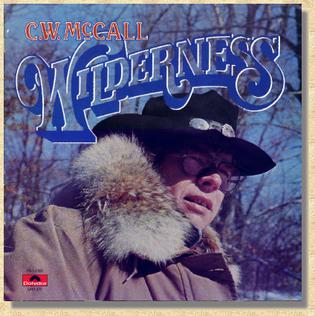
Wilderness is an album by country musician C. W. McCall, a pseudonym of singer and advertising executive Bill Fries, released on Polydor Records in 1976. As its title suggests, it focuses on subjects connected with nature, the environment and humans' impact on them. "There Won't Be No Country Music ", for example, is a statement on the environment's bleak-looking future and the effects of over-commercialization bordering on propaganda. "Crispy Critters", on the other hand, is the humorous telling of a true tale involving a group of hippies riding into a town and being forced away and threatened by the mayor.
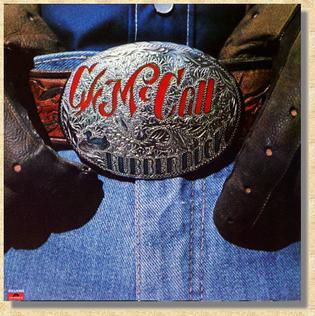
Rubber Duck is an album by country musician C. W. McCall, released on Polydor Records in 1976. It is his fourth album, released the same year as Wilderness, but concentrating on the themes the McCall character was popular for – trucking, as opposed to the various depictions of nature that could be found in Wilderness. Among others, the album contains the song "'Round the World with the Rubber Duck", a sequel to McCall's earlier wildly popular hit "Convoy", with many humorous and absurd elements added. "Audubon" is a quasi-autobiographical song, while "Ratchetjaw" is a take on trucker slang, with a multitude of CB-related terminology included in the lyrics.
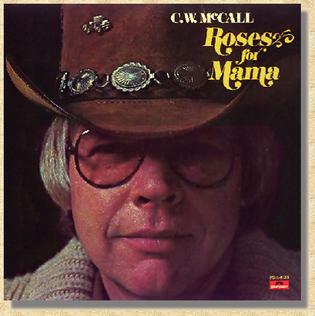
Roses for Mama is the fifth album by country musician C. W. McCall, released on Polydor Records in 1977. The album saw McCall singing several songs that were written by others, as opposed to his previous albums, which were written entirely by himself and Chip Davis. In fact, only three songs were written by the McCall and Davis; these are "I Don't Know ", "The Gallopin' Goose" and "Old Glory". "The Battle of New Orleans" is a cover version of Johnny Horton's popular 1959 song.

The Real McCall: An American Storyteller is an album by country musician C. W. McCall, released on American Gramaphone in 1990 and rereleased in 1999. It features revamped digital versions of some of McCall's better known songs, including "Convoy", "Wolf Creek Pass" and "Black Bear Road", rerecorded by the artist for the album. It contains more songs than any other release by the artist, with sixteen tracks in total. It features songs from most of McCall's albums, the exceptions being his later works, C. W. McCall & Co. and Roses for Mama. One new track, "Comin' Back for More", telling the story of the infamous American cannibal Alferd Packer, was recorded for the album and serves as its opener. Songwriting on the album is credited to lyricist Bill Fries and composer Chip Davis, who together have created nearly all original songs by McCall throughout the history of the character.

American Spirit is an album released on American Gramaphone in 2003 as a collaboration between Mannheim Steamroller and country musician C. W. McCall. The album focuses on American patriotic songs, hence the title. McCall contributed to a number of spoken word songs on the album and rerecorded his 1976 hit song "Convoy" for it; this was also the case with another song of his, "Wolf Creek Pass," which can be found on the album. McCall is a persona created by Bill Fries and Manheim Steamroller leader Chip Davis; Fries provides the vocals as McCall. This was the last album to feature C. W. McCall.

Fresh Aire II is the second album that new-age musical group Mannheim Steamroller originally released in 1977. Each of the first four Fresh Aire albums is based on a season; Fresh Aire II's theme is fall.

Saving the Wildlife is an album by Mannheim Steamroller, released in 1986. It was written for the soundtrack of a PBS special by the same name, except for "Dolphins and Whales," which originally appeared on Fresh Aire VI as "Come Home to the Sea".

Room to Breathe is the twenty-sixth studio album by American country music singer Reba McEntire. It was released on November 18, 2003, by MCA Nashville Records. It was produced by Buddy Cannon, McEntire, and Norro Wilson.

Unlimited is Reba McEntire's fifth studio album. It featured her first number one hits "Can't Even Get The Blues" and "You're the First Time I've Thought About Leaving". It was one of her first Mercury albums to be released on CD in 1990, but like most of her early material, it is now only available as a digital download.

St. Vincent's Court is the fourth studio album by Kim Carnes, released in 1979.
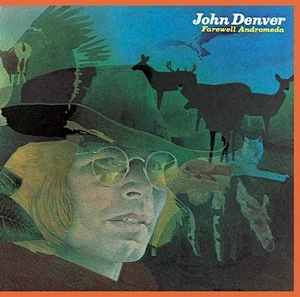
Farewell Andromeda is the seventh studio album by American singer-songwriter John Denver, released in June 1973. The LP made Billboard's Top 20, reaching No. 16, with three singles subsequently released: "I'd Rather Be a Cowboy" [#62 POP, #25 AC], "Farewell Andromeda" [#89 POP, No. 20 AC] and "Please, Daddy" [#69 POP, No. 69 C&W].
Dolenz, Jones, Boyce & Hart was a supergroup, consisting of songwriting/performing duo Boyce and Hart and two members of the Monkees, Micky Dolenz and Davy Jones. Boyce and Hart had written many of the Monkees' biggest hits, such as "Last Train to Clarksville" and "(Theme From) The Monkees". The group existed only for a short time in 1976, recording one eponymous album.
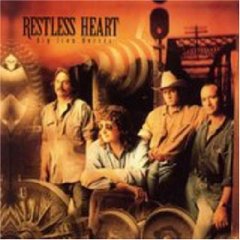
Big Iron Horses is the fifth studio album by American country music group Restless Heart. It was released by RCA Nashville in 1992. "When She Cries," "Mending Fences," "We Got the Love" and the title track were released as singles. The album reached #26 on the Top Country Albums chart and has been certified Gold by the RIAA. This is also the band's first album not to feature lead vocalist Larry Stewart, who departed in 1991. Conversely, drummer John Dittrich, keyboardist Dave Innis, and bassist Paul Gregg alternate as lead vocalists on this album.

The Nitty Gritty Dirt Band is the first album by the Nitty Gritty Dirt Band, released in 1967. This album debuted on the U.S. Billboard Top Pop Albums chart on April 8, 1967, peaked at number 161, and was on the charts for eight weeks. The single "Buy for Me the Rain" b/w "Candy Man" debuted on the U.S. Billboard Hot 100 on April 8, 1967, peaked at number 45 on May 6, 1967, and was on the charts for seven weeks. In Canada, the single reached number 37 in May 1967.
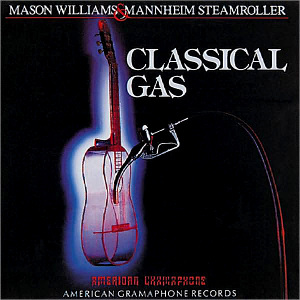
Classical Gas is a 1987 album by new age group Mannheim Steamroller and guitarist/composer Mason Williams. The album's title piece, "Classical Gas", was originally featured on Williams's 1968 solo album The Mason Williams Phonograph Record.
















